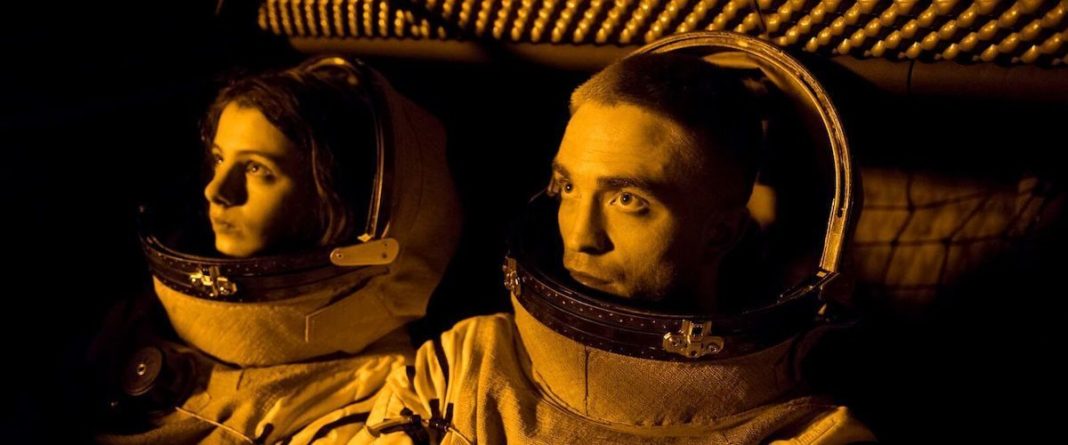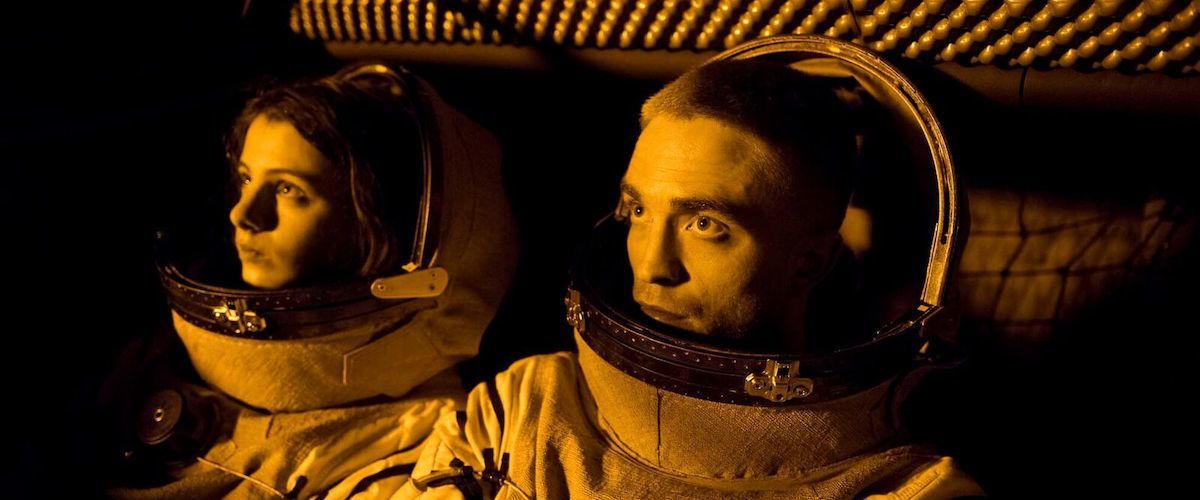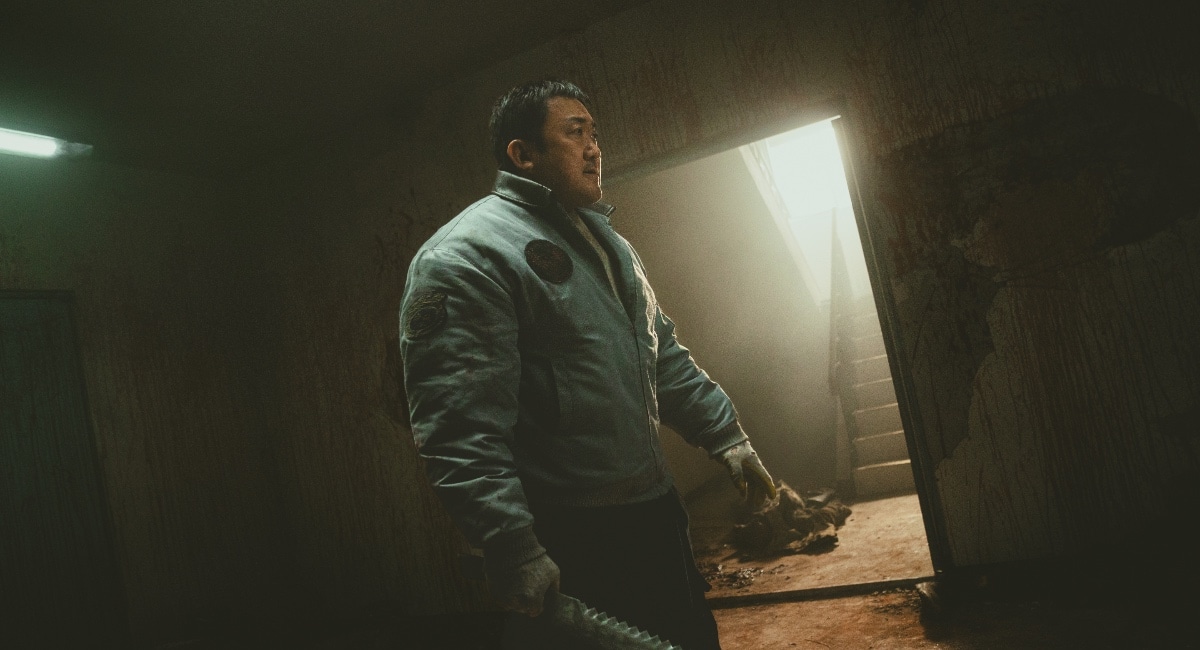Claire Denis, the French auteur whose career has been so marked by the influence of French modernity, has at the tender age of 72 finally made her first English language feature. In so doing she also leaps into her first genre, or at least genre in the sense that you’d expect a Claire Denis film to give birth to.
High Life stars Robert Pattinson, who along with Kristen Stewart, continues to carve a fascinating post-Twilight career path. He’s right there with Joaquin Phoenix as an actor who continues to choose intriguing project after project, and this effort furthers that trend. You also get to hear him tell Juliette Binoche that she is “the shaman of sperm,” while she in turn gets to tell Mia Goth that “douching is for amateurs.” So really, this is a can’t lose proposition!
Pattinson plays a man adrift in space, in what is seemingly an otherwise abandoned space shuttle. His days are basically confined to caring for a baby, whose ear piercing wails (which might double as birth control all on their own) are his sole source of conversation, with the exception of each day’s requirement of a verbal report given to a computer that restores life support systems. It’s a bit like Desmond in LOST, “feeding the dog” he calls it, a statement that carries personal weight for his protagonist both in the past and his immediate future.
If this was all High Life was, it would be a fascinating, if small experiment, with a woman filmmaker striking her own path in the typically male-dominated ordinances of sci-fi cinema. But, fear not, as I’m happy to state that background information is quick to come. It turns out that our man, Monte, is actually a part of a larger crew that met an untimely end, and High Life spends much of its time unveiling just how that happened. Their vessel is actually a prison barge of a sort; in this era of space travel, hardened criminals of varying circumstance exchange their sentences to instead go on a (unbeknownst to them) one way journey to study and potentially capture the energy of black holes. Monte’s shipmates include a varying cadre of faces played by the likes of Goth, Andre Benjamin (or Andre 3000, if you will), Lars Eidinger and others. This a tale where the events that happen to these characters build to a greater point that Denis is aiming straight at your cortexes.
This larger thematic piece centralizes itself in Binoche’s mad scientist/reproduction expert, Dr. Dibs, who for reasons that come to be revealed as the time ticks on, is on a regular basis collecting sperm samples of the male crew members. Her direct goal is to impregnate one of their opposite gender crew members, an experiment that consistently fails. Monte, on the other hand, has taken a vow of chastity, for reasons that give him strength and potentially play into his own atonement for his crimes. You see, High Life is a film that centers itself on the idea of the human condition, particularly as opposed to the precipice of oblivion that the ship continues to hurtle towards. This may look like the Discovery One, but much like on Earth, people still treat one another like garbage or even worse, like objects to be had and bodies to be commodified in some way. Everyone is defined by their goals, or rather in this case, their carnal desires. The biggest turn towards that moment finds Dibs entering an enclosed space on the ship called the “F*ck Box” and riding what is basically a pommel horse with a dildo strapped on it and gyrating into an animalistic style lust worthy of a Lower East Side art performance piece. Once you see the…aftermath…getting washed out of that structure, you quickly realize you’re in for something far beyond the 2001/Solaris/Alien oeuvre that marks that usual boundaries of the genre.
In fact, it’s a confounding and frankly polarizing film, and Denis does not hold your hand, instead lingering on smaller details of each of its crew members that add up to a larger whole that is left for the audience to tease and puzzle out “just what it was all about”. This is particularly true after the crew itself continues to splinter after a number of violations occur, as each of the film’s fully projected predators finally strike at their long desired prey, and we then return to Monte: raising this child that is now his lone responsibility and is in turn becoming a growing woman. He is a criminal, having reached some level of that aforementioned atonement in the eyes of the law through service, now doing the same for his own soul through fatherhood. Or is he simply trying to live on through her or stave off the growing loneliness that will continue to engulf him in the eternal void? Just what is the end goal? What is anyone’s really? And at what point do we finally earn that respite after a lifetime’s worth of struggle and coexistence with those that would do us harm?
It’s slow, plodding, methodical, puzzling, enrapturing, and even a bit noxious, all the while imbued by the scoring of Stuart Staples (of the Tindersticks) comprised of hypnotizing synth waves that encapsulate the growing isolation and dread of their mission. As it stands, I’m so glad this movie exists. I only hope I’m so daring when I’m 72 years old, provided I’m lucky enough to make it.
Home Entertainment Movies Review: With HIGH LIFE, Claire Denis recalculates sci-fi with a heaping dose...










That’s the question I ask in my evaluations of all the movies I watch: am I glad this movie exists? Most things are secondary to that.
I’ve seen Beau Travail and Chocolat from Denis’ long filmography, both when I was too young and not as widely read. It would all be unencountered.
Comments are closed.